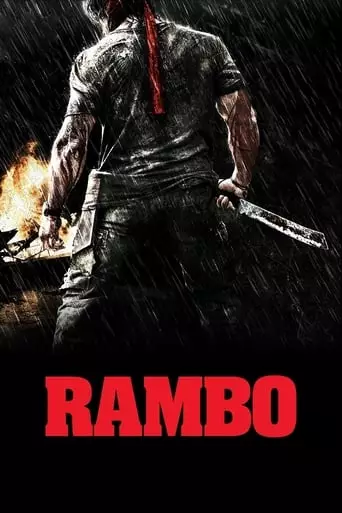
Rambo (2008) Watch Online Free
In Thailand, ex-Green Beret John James Rambo joins a group of mercenaries to venture into war-torn neighboring Myanmar to rescue a group of Christian aid workers who have been kidnapped by a ruthless local infantry unit.
Rambo (2008), the fourth installment in the iconic action series, marks the return of Sylvester Stallone as John Rambo, a man who once served as a Green Beret but now lives in seclusion in northern Thailand. The film follows his reluctant return to action after a group of American missionaries asks for his help in navigating the dangerous, war-torn border region between Thailand and Burma to deliver aid to the oppressed Karen people. When the missionaries are captured by a brutal Burmese military regime, Rambo is compelled to lead a rescue mission that becomes an explosive fight for survival.
The film opens with Rambo living a quiet life in the jungles of Thailand, where he catches snakes for a living. However, his life is disrupted when a group of Christian missionaries, led by Sarah Miller (Julie Benz), requests his help to take them to Burma. Despite initially rejecting their request, Rambo is convinced to assist them, taking them by boat along the perilous Salween River. Unfortunately, the group is ambushed by pirates, leading to their eventual capture by the soldiers of the sadistic Major Pa Tee Tint (Maung Maung Khin). Rambo returns to Thailand to find mercenaries willing to mount a rescue mission.
The rescue mission sets the stage for the intense action and violence that follows. As the group infiltrates Burma to rescue the hostages, Rambo demonstrates his lethal skills, taking down Burmese soldiers with bows, arrows, and guerrilla tactics. The final act sees Rambo unleashing brutal revenge, ultimately destroying the enemy forces with heavy artillery and the help of Karen rebels.
The themes of Rambo are deeply rooted in violence, trauma, and redemption. The film highlights the horrors of war and the toll it takes on those who survive it, particularly through the character of Rambo, who is burdened by his past experiences in Vietnam. The brutal and graphic portrayal of the atrocities in Burma underscores the inhumane consequences of unchecked military regimes.
Another significant theme is the concept of heroism. While Rambo is portrayed as a reluctant hero, the film reflects the idea of redemption through action. Rambo’s final intervention is driven not only by a desire to rescue the missionaries but also by a personal need to redeem himself for his past sins. His actions challenge the idea of traditional heroism by showing a man who is broken and scarred but willing to fight for a cause greater than himself.
The film also explores the complex relationship between violence and peace. It raises ethical questions about the use of force to fight evil and whether extreme violence is justified in the face of unchecked brutality. Rambo himself represents a paradox—his brutal actions are what save lives, yet they also symbolize his ongoing internal conflict between a violent past and the hope for peace.
After watching Rambo (2008), you will likely feel a mix of exhilaration and discomfort. The intense action sequences and brutal violence will leave you with a sense of awe at the sheer ferocity of the protagonist, but also a feeling of unease given the real-world context of the conflict depicted. The graphic violence is disturbing, but it serves to underline the horrors that Rambo is confronting, both externally and within himself.
You may also experience a sense of moral reflection—while Rambo’s methods are extreme, the film challenges the viewer to question whether violence can ever be justified in the pursuit of a higher good. The themes of redemption and guilt will resonate, as Rambo’s actions highlight the difficulty of escaping one’s past, and the ongoing battle between personal demons and the desire to do good.
Ultimately, Rambo (2008) is not just a straightforward action film but a meditation on violence, sacrifice, and redemption, leaving you to ponder the ethical complexities of war and heroism long after the credits roll
